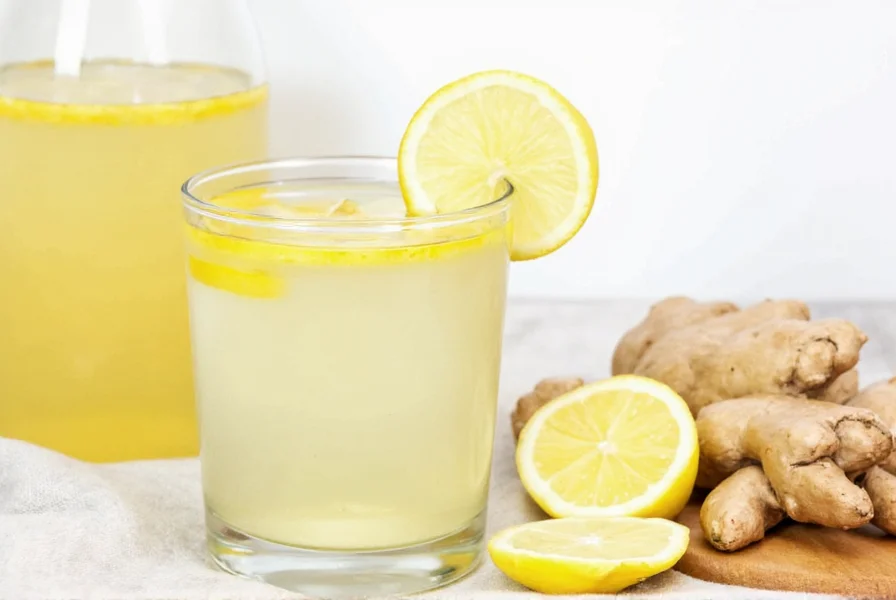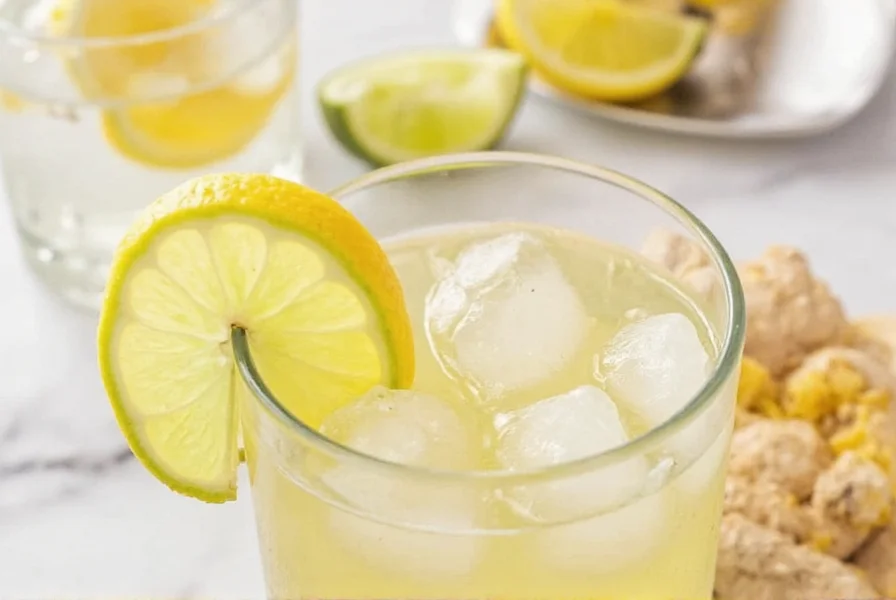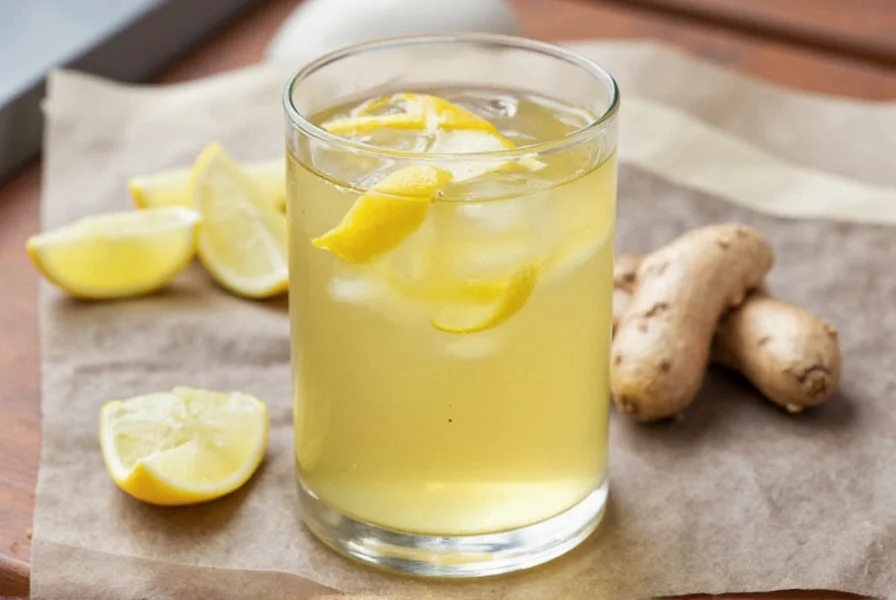Making ginger water at home is a straightforward process that requires minimal ingredients and equipment. This ancient remedy has gained popularity in modern wellness circles for its potential digestive and anti-inflammatory benefits. Whether you're looking for a refreshing alternative to sugary drinks or exploring natural wellness practices, learning how to prepare ginger water properly ensures you get the most from this simple beverage.
The Health Benefits of Ginger Water
Ginger contains bioactive compounds like gingerol that have been studied for their potential health effects. Research suggests ginger may support digestion, reduce nausea, and provide antioxidant benefits. When consumed as ginger water, these properties become accessible in a hydrating, low-calorie format. It's important to note that while ginger water can complement a healthy lifestyle, it shouldn't replace medical treatment for specific health conditions.
Basic Ginger Water Recipe
Creating authentic ginger water starts with selecting quality ingredients and following proper preparation techniques. Here's a detailed method for making ginger water that maximizes flavor and potential benefits:
What You'll Need
- 1-2 inches of fresh ginger root (about 30g)
- 4 cups (1 liter) of filtered water
- Vegetable peeler or spoon
- Sharp knife or mandoline slicer
- Medium saucepan
- Strainer or cheesecloth
- Glass pitcher for storage
Step-by-Step Preparation
- Wash the ginger root thoroughly under running water
- Peel the ginger using a vegetable peeler or the edge of a spoon
- Slice the ginger into thin rounds (about 1/8 inch thick) or mince finely for stronger flavor
- Add water to a saucepan and bring to a rolling boil
- Reduce heat to medium-low and add the ginger slices
- Simmer uncovered for 5-20 minutes (longer for stronger flavor)
- Remove from heat and let cool slightly
- Strain the liquid into a pitcher using a fine mesh strainer
- Enjoy immediately or refrigerate for later use
| Preparation Method | Steeping Time | Flavor Intensity | Best For |
|---|---|---|---|
| Quick steep (hot water) | 5-10 minutes | Mild | Daily hydration, sensitive stomachs |
| Simmered | 15-20 minutes | Medium-strong | Maximum potential benefits, robust flavor |
| Cold brew | 4-12 hours | Mellow | Summer drinks, subtle flavor preference |
Popular Variations to Enhance Your Ginger Water
While plain ginger water offers pure flavor and potential benefits, many people enjoy customizing their beverage:
- Lemon-ginger water: Add the juice of half a lemon after straining for vitamin C boost and refreshing citrus notes
- Honey-ginger water: Stir in 1 teaspoon of raw honey once the water has cooled slightly (never add honey to boiling water)
- Mint-infused ginger water: Add 5-6 fresh mint leaves during the last 5 minutes of steeping
- Spiced ginger water: Include a cinnamon stick or a few cardamom pods while simmering

Cold Brew Method for Refreshing Ginger Water
For those who prefer iced beverages or want a more delicate flavor profile, the cold brew method works exceptionally well:
- Peel and thinly slice 1-2 inches of ginger
- Add slices to 4 cups of cold filtered water in a glass pitcher
- Cover and refrigerate for 4-12 hours (longer for stronger flavor)
- Strain the liquid before serving
- Add ice cubes and optional lemon slices
This gentle extraction method produces a smoother, less pungent ginger water that's perfect for warm weather. The cold brew technique also preserves more of ginger's volatile compounds that might evaporate during heating.
Storage Guidelines and Shelf Life
Proper storage maintains both the flavor and potential benefits of your ginger water:
- Store in a sealed glass container in the refrigerator
- Consume within 3-4 days for best quality
- Shake gently before serving as natural separation may occur
- Do not freeze ginger water as this alters the texture and flavor profile
- If making large batches, consider freezing ginger-infused ice cubes for future use

Common Mistakes to Avoid When Making Ginger Water
Even simple recipes can go wrong if key details are overlooked. When preparing ginger water at home, watch out for these common pitfalls:
- Using insufficient ginger: Too little ginger results in weak flavor and minimal potential benefits. Stick to the 1-2 inch guideline for 4 cups of water.
- Over-boiling: Extended boiling (beyond 20 minutes) can create a bitter taste. Simmer gently rather than boiling vigorously.
- Adding honey to boiling water: High heat destroys beneficial enzymes in raw honey. Wait until the water has cooled to below 140°F (60°C).
- Using old ginger: Fresh ginger should be firm with smooth skin. Wrinkled or soft ginger indicates age and reduced potency.
- Skipping the straining step: Leaving ginger pieces in the water continues the steeping process, potentially making the beverage too strong.
When to Drink Ginger Water for Best Results
Timing your ginger water consumption can enhance its potential effects:
- Morning: Start your day with warm ginger water to support digestion and hydration after sleep
- Before meals: Consuming 15-20 minutes before eating may support digestive processes
- After travel: Ginger's potential anti-nausea properties make it helpful after long journeys
- During cold season: The warming properties may provide comfort when feeling under the weather
Listen to your body's response and adjust timing based on your personal experience. Some people find ginger water energizing, while others appreciate its calming effect.
Frequently Asked Questions
How long should I let ginger steep in water for optimal flavor?
For hot ginger water, steep sliced ginger in boiling water for 5-10 minutes for mild flavor or simmer for 15-20 minutes for stronger taste. Cold brew methods require 4-12 hours in the refrigerator. The ideal steeping time depends on your flavor preference and intended use - shorter times create milder ginger water suitable for all-day sipping, while longer steeping extracts more of ginger's compounds for potentially greater benefits.
Can I reuse ginger after making ginger water?
Yes, you can reuse ginger pieces for a second batch of ginger water, though the flavor and potential benefits will be noticeably weaker. The second infusion typically requires longer steeping time. After two uses, the spent ginger can be added to compost or used in small amounts in cooking. For maximum benefits, fresh ginger is recommended for each batch.
Is it better to drink ginger water hot or cold?
Both hot and cold ginger water offer potential benefits, but they serve different purposes. Hot ginger water provides immediate warmth and may support digestion more effectively when consumed before meals. Cold ginger water (especially cold-brewed) offers a refreshing alternative with a milder flavor profile. The best choice depends on personal preference, weather, and intended benefits - neither method is inherently superior for all situations.
How much ginger water should I drink per day?
Most experts suggest limiting ginger consumption to 3-4 grams per day for adults, which translates to approximately 2-3 cups of standard-strength ginger water. Start with smaller amounts (1 cup daily) to assess your body's response, then gradually increase if desired. People with certain health conditions or taking medications should consult with a healthcare provider before consuming ginger regularly.
Does ginger water help with weight loss?
Ginger water itself doesn't cause weight loss, but it can support weight management efforts as a low-calorie alternative to sugary beverages. Some studies suggest ginger may modestly support metabolism and reduce appetite, but these effects are subtle. The primary weight-related benefit comes from replacing high-calorie drinks with this zero-calorie option. Sustainable weight management requires comprehensive lifestyle changes beyond any single beverage.











 浙公网安备
33010002000092号
浙公网安备
33010002000092号 浙B2-20120091-4
浙B2-20120091-4